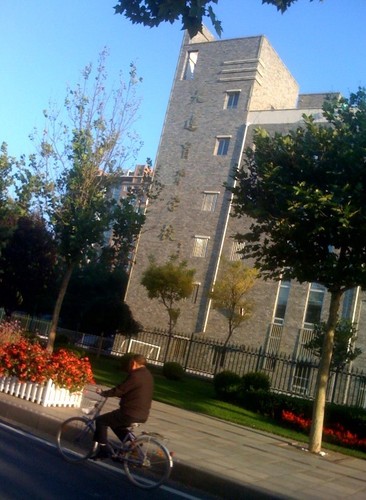China and Blindness
As I parked my Mobike on the sidewalk, I wondered to what extent blind people are hindered by the hundreds of bikes and cars that are parked on the tiles that are marked to guide blind people to the entrance of the subway. Maybe this thought was more at the forefront, as recently I had met a young guy who is blind and shared some of his struggles with me. His name is Mark.[1]
Last month I was introduced to this young man who wanted to improve his spoken English in preparation for an English exam. Mark was very engaging, well informed, and clear about what he was after. His English is quite good, which made communication easy. He is also tech-savvy and used his mobile phone with ease—which somewhat surprised me, as he is totally blind.
China has 17 million visually impaired people, of which 6 million are completely blind.[2] The situation for people who are blind or have visual impairments in China has improved significantly over the last few decades. There are opportunities to attend school up to secondary level, and blind people can be trained as professional masseurs. Yet, they still face many major challenges in life, including social participation, using public transport, and finding employment.
So, what do Mark and others who are blind or have a visual impairment have to do with us? How could we as Christians respond to Mark and others?
Assistive Technology
While chatting with Mark, he asked if he could add me to his WeChat contacts. “Of course,” I answered, wondering how this was going to work. To clarify things somewhat, I asked him, “So I only send you spoken messages, I guess?” “Oh no,” he answered matter-of-factly, “you can send either spoken or written messages.”
Still not quite sure how this was going to work, I asked him sheepishly, “But Mark, you are blind. How can you read my message?” Mark smiled. I’m not sure what he thought about this uninformed foreigner at that moment. He told me that written messages are no problem for him.
I asked him if we could try it, as I was keen on seeing how he would tackle this “written message” problem. So, I sent him a short message, saying “Hi Mark. This is Michelle.” I told him that I sent the message. Had he received it? He put his phone next to his ear, and all I heard was some incomprehensible quick-paced noises. His fingers went over the phone screen, in no time he tapped on something, and to my surprise I heard an automated voice say, “Hi Mark. This is Michelle.”
Assistive technology has definitely reached blind people in China! What a blessing and a great support for them, which makes communication with others so much easier.
Educational Challenges
China has had schools for the blind for a relatively long time. In the 19th century, foreign Christians set up schools for blind, orphaned children.[3] After 1949 these schools were changed into state schools. When I came to China in the early 2000s, there were already schools for the deaf and the blind available. However, according to The Economist, only a small number of blind people receive basic education, with only 22 schools for the blind, teaching about 1,500 students.[4] The chance to enter university is even smaller.
Mark belongs to the fortunate few. He had the opportunity to study at a university, and has been able to get his bachelor’s degree. Seemingly an optimist at heart, Mark is pursuing further studies. Now that he has a bachelor’s degree, he aims to do a postgraduate course. Although blind students in China can officially take postgraduate courses, yet practically speaking it is often more complicated. The reality is that Mark can only start a master’s course if he has the right “guanxi” as well as plenty of financial resources to “buy himself into” a postgraduate course. As he lacks both, he has set his hopes on doing further studies overseas. That is not straightforward either, as he needs to get an IELTS score of at least 7, and needs to find out what courses, resources, and support are available to people like him in other countries. Besides that, in order to go overseas he will also need funding. So, educational opportunities don’t come easy when you’re blind.

School for the Deaf and Blind in Dalian, China
Barriers in Public Transport
One challenge blind people in China face on a daily basis, is how to get around on your own. In the last decade or so, China has worked hard on improving the physical environment for people with disabilities. Two examples are the tactile paving on sidewalks and the braille in some of the newer buildings. Last week I was in a shopping mall, and the elevators have signage for blind people in braille. Of course, the question is how people can get to the shopping mall in the first place, when public transport is hard to access.
While tactile paving can be seen in most big cities, they often end suddenly or are “interrupted” by obstacles, which makes walking with a white cane very challenging. Just about everywhere bikes and cars are parked across the sidewalks, including right on top of the tactile paving.
Sometime ago, I saw a blind man, who came out late at night, and instead of following the lined tiles, he walked on the road, using the edge of the sidewalk as his point of reference. It is not hard to imagine that going out as a blind person onto Chinese streets, is something to be dreaded.
Mark told me that an additional challenge for him when he goes out is the attitude of society. There are not many people who are willing to help him.

A park map at Shanghai Disneyland with braille.
Three Ways of Support
So how can Christians make a difference in the lives of blind people in China? Here are just three practical ways to start with.
1. Be aware of how you park your bike!
Most people using Mobike, OFO,[5] or similar bikes, want to park the bike as close to their place of destination as possible, which means, for instance, right near the entry to the subway. As a result, most people don’t stick to the allocated areas for parking bikes, and bikes easily end up right on top of the tactile pavers. For Christians living in China, one simple way of making a difference is being aware of where you park your Mobike. Next time you park, just check to be sure you haven’t parked your bike on the tactile pavers.
2. Give blind people support as needed
Of course, the problem is deeper than just parking our bikes in a way that doesn’t hinder blind people as they walk along the tactile paving. A much greater challenge is our attitude towards blind people. Acceptance of people with visual impairments is still something to be desired in China. Changing attitudes is not a job easily done. It requires time, great effort, as well as modelling an alternative. Here is where Christians can make a real difference. When we see a blind person in public, do we approach them and ask if they need help or support? Let’s not just assume they do, but let’s ask them, and provide the support if there is a need.
3. Become friends with blind people
Taking that one step further, could we befriend blind people and include them in our social networks? What could be the role of Christians in this process? One example is a Chinese Christian who heard about Mark’s challenges, and simply acted. She was not someone in a position of great power, but she did what she could do. She knew some foreigners and asked if one of them would be willing to help Mark improve his spoken English, so he could get the required score on his next IELTS exam. She has befriended Mark and his family. What a great example to follow!
Conclusion
Today blind people like Mark have increased opportunities for communication, transportation, education, and employment. However, they still face many challenges in these same areas. Some ways in which Christians in China can help blind people include considering their practical needs, reaching out to them, and modelling how to include them in their communities.
Have you been in touch with a blind person in China? Or have you given thought to how Christians could reach out to blind people? Please share your ideas or experiences with us. Write to editorial@chinasource.org.
References
- “Blind and Sighted Pioneer Teachers in 19th Century China and India” (revised edition), Independent Living Institute, April 2011, https://www.independentliving.org/docs7/miles201104.html.
- “Braille and blindness in China” by Andrew Jones. GBtimes, April 18, 2011, https://gbtimes.com/braille-and-blindness-in-china.
- “China: Guangzhou School for the Blind” by Jessie Li. Pulitzer Center, January 26, 2015, https://pulitzercenter.org/reporting/china-guangzhou-school-blind.
- “China Opens Its First Church for the Blind, ChinaSource Team. Chinese Church Voices on ChinaSource, January 4, 2013, https://www.chinasource.org/resource-library/chinese-church-voices/china-opens-its-first-church-for-the-blind.
- “Death by Tactile Paving: China’s Precarious Paths for the Visually Impaired” by Kurt Kohlstedt. 99% Invisible, February 3, 2017, https://99percentinvisible.org/article/death-tactile-paving-chinas-precarious-paths-visually-impaired/.
- “Feeling their way” The Economist, July 13, 2013. https://www.economist.com/china/2013/07/13/feeling-their-way.
Header image credit: Michelle Woods
Text images credit: School for the Deaf and Blind in Dalian by by SoniaT 360 via Flickr, Braille map at Disneyland in Shanghai by Joel via Flickr.
Michelle Woods
Michelle Woods (pseudonym) has a master’s degree in special education and has lived in China since the early 2000s working with children with disabilities and those who care for them.View Full Bio
Are you enjoying a cup of good coffee or fragrant tea while reading the latest ChinaSource post? Consider donating the cost of that “cuppa” to support our content so we can continue to serve you with the latest on Christianity in China.

